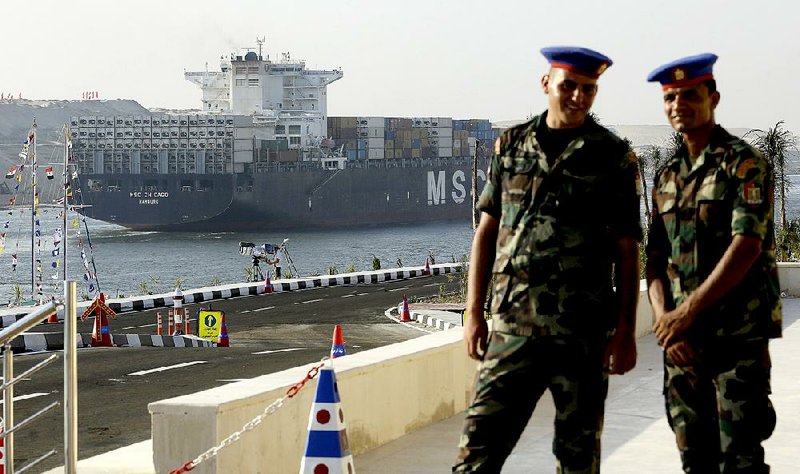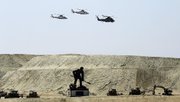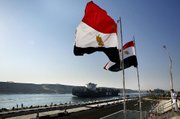ISMAILIA, Egypt -- With much pomp and fanfare, Egypt on Thursday unveiled a major extension of the Suez Canal billed by President Abdel-Fattah el-Sissi as a historic achievement needed to boost the country's ailing economy after years of unrest.
El-Sissi, wearing his ceremonial military uniform on a sweltering August day, flew to the site aboard a military helicopter and immediately boarded a yacht that sailed to the venue of the ceremony.
The yacht was flanked by navy warships as helicopters, jet fighters and military transport aircraft flew overhead. A visibly triumphant el-Sissi stood on the vessel's upper deck, waving to well-wishers and folklore dance troupes performing on shore. At one point, a young boy in military uniform and holding an Egyptian flag joined him on deck.
Later in the day, the president changed to a dark-gray business suit and took his seat at the main stand for an elaborate ceremony in the canal city of Ismailia, attended by foreign dignitaries and organized amid tight security measures after a series of attacks by Islamic militants in the Sinai Peninsula and the capital, Cairo.
"Egyptians have made a huge effort so as to give the world this gift for development, construction and civilization," el-Sissi said at the ceremony. Egyptians, he added, "showed their ability to efficiently make history and leap to the future for the prosperity of humanity."
His address was interrupted by the ship horns of container vessels using the new extension.
Among those at the ceremony were French President Francois Hollande, King Abdullah of Jordan and King Hamad bin Isa Al Khalifa of Bahrain, Palestinian President Mahmoud Abbas, Emir Sheik Sabah Al Ahmed Al Sabah of Kuwait, Greek Prime Minister Alexis Tsipras, exiled Yemeni President Abed Rabbo Mansour Hadi and Sudanese President Omar al-Bashir.
Egypt's black, white and red flag now adorns streets across much of the nation, along with banners declaring support for el-Sissi. The government declared Thursday a national holiday, and banks and most businesses were closed.
The $8.5 billion Suez Canal expansion involved digging and dredging along 45 miles of the 119-mile canal, making a parallel waterway at its middle that will facilitate two-way traffic. With a depth of 79 feet, the canal now allows the simultaneous passage of ships with up to 66-foot draught.
The government says the project, funded entirely by Egyptian investors, will more than double the canal's annual revenue to $13.2 billion by 2023, injecting much-needed foreign currency into an economy that has struggled to recover from the 2011 uprising that toppled President Hosni Mubarak and the years of turmoil that followed.
Economists and shippers have questioned the value of the project, saying the increased traffic and revenue the government is hoping for would require major growth in global trade, which at this point seems unlikely.
El-Sissi said the project also reassured his countrymen and the world that Egyptians "are still capable" of great accomplishments.
The man-made waterway linking the Red Sea to the Mediterranean, which was inaugurated in 1869, has long been seen as a symbol of Egyptian national pride.
Thursday's ceremony was partially overshadowed by an Islamic State affiliate's threat to kill a Croatian hostage kidnapped in Cairo last month.
The affiliate, calling itself the Sinai Province of the Islamic State, released a video Wednesday threatening to kill the Croatian in 48 hours if Egyptian authorities do not release "Muslim women" held in prison, a reference to female Islamists detained in the government's broad crackdown on former President Mohammed Morsi's supporters.
The 30-year-old Croatian father of two, Tomislav Salopek, was kidnapped on July 22. There have been conflicting reports on where he was snatched. An official at the French company he worked for in Egypt said he was taken from his car at 7 a.m. in an area west of Cairo while making his way to the city's airport from a company site. Other reports spoke of him being snatched in the Cairo suburb of Maadi, a quiet and leafy neighborhood where many of the city's Western community live.
If confirmed, a broad daylight kidnapping of a foreigner in a Cairo suburb could cause panic among the city's security-conscious expatriate community. Croatian state TV reported Thursday afternoon that Foreign Minister Vesna Pusic left for Cairo together with Salopek's wife, Natasa.
El-Sissi made no mention of the Croat's kidnapping, but denounced the Islamic militants battling his government as "the evil people" seeking to "hurt Egypt and the Egyptians."
"Without a doubt, we will triumph over them," he added.
Egypt has seen a surge in attacks by Islamic militants since Morsi's ouster, in both the restive north of the Sinai Peninsula and the mainland, focusing primarily on security forces.
The violence continued Thursday, with militants shelling two homes near security checkpoints in northern Sinai, killing two people and wounding nine, according to Egyptian security officials who spoke on condition of anonymity because they were not authorized to speak to the media.
Also Thursday, a soldier standing guard at a military checkpoint in northern Sinai was killed by sniper fire, the officials said.
A Section on 08/07/2015


